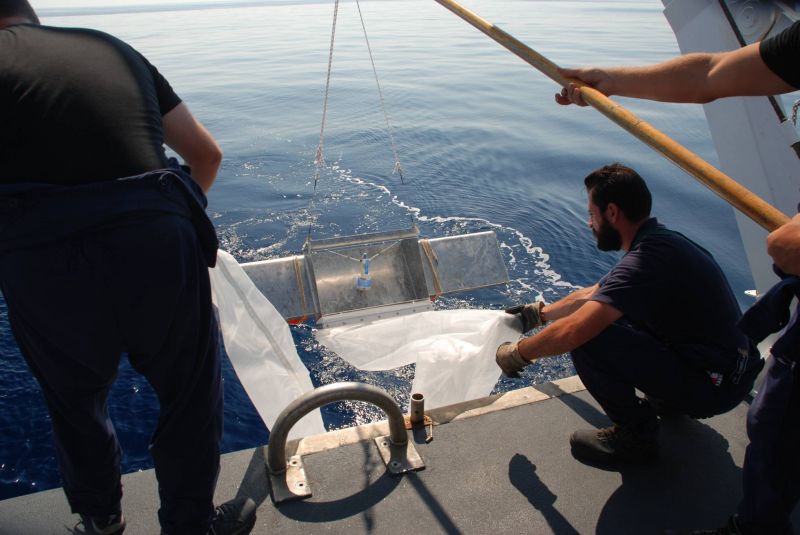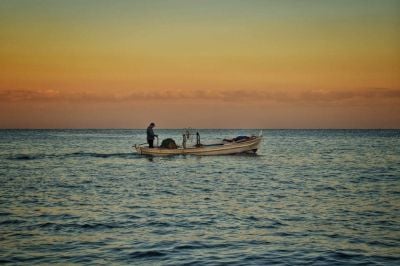
Workers remove plastic from the sea. (Courtesy of: Plastic Busters)
World Environment Day, which falls each year on June 5, has been an opportunity to raise the now monumental problem of microplastics at sea.
These microscopic particles, originating from waste that disintegrates in the water, have entered the entire food chain, posing a threat to humans and marine life alike.
In the Mediterranean, the stakes are high: according to a 2020 report by the International Union for Conservation of Nature, “an estimated 229,000 tons of plastic is leaking into the Mediterranean, equivalent to over 500 shipping containers each day.”
Almotaz Abadi, deputy secretary general in charge of water, environment and blue economy at the Union for the Mediterranean (UFM), spoke to L’Orient-Le Jour of ways to reduce this pollution.
“Plastic pollution in the Mediterranean Sea is a threat to the well-being, economic resilience and environmental sustainability of countries in the region,” he said.
“The potential effects on human health are not yet fully understood, and ongoing scientific studies aim to investigate this impact. It has been demonstrated that marine species are ingesting plastics, whether intentionally, accidentally, or indirectly by consuming prey that has already consumed plastics. However, further analysis is ongoing to determine the extent to which toxic substances from plastics affect [bodily] tissues and, consequently, our food,” he added.
In the meantime, there is an urgent need for measures to reduce pollution.
Although Lebanon is lagging behind in waste management policies in general, it is nonetheless included in Mediterranean programs aimed at curbing this scourge.
For the Mediterranean: A model sea
On a regional and global level, negotiations to drastically reduce plastic waste at sea are underway.
Two weeks ago marked the “second meeting of the Intergovernmental Negotiating Committee (INC) in Paris, representing a significant step forward in a process that began in February 2022,” said Abadi.
“At that time, the United Nations Environment Assembly adopted a groundbreaking resolution to develop an international legally binding instrument on plastic pollution, including its impact on the marine environment, with the aim of concluding the negotiations by the end of 2024. The instrument is intended to encompass a comprehensive approach that addresses the entire life cycle of plastic,” he added.
“As an observer at the United Nations, the UFM has been closely monitoring the progress of these international negotiations on plastic pollution from the very beginning … providing regular updates to its member countries, including Lebanon. ”
Abadi explained that the UFM supports the southern Mediterranean countries, including Lebanon, in revising their policies and legal instruments, through the Water and Environment Support (WES) project. This is funded by the European Union’s Directorate-General for Neighbourhood and Enlargement Negotiations (DG NEAR), and the Plastic Busters CAP, endorsed and supported by the UFM.
The WES project aims to reduce the impact and leakage of single-use plastics (SUP) into the environment. Since March 2022, the project has been providing technical assistance to Lebanon’s Environment Ministry in this regard.
Supermarkets on board?
“The focus of the assistance is on analyzing the socioeconomic effects of policy measures, such as reducing or banning certain single-use plastic products and promoting alternative solutions including non-plastic alternatives or reuse options,” said Abadi.
“It also involves facilitating sector dialogue with key stakeholders and identifying a nationwide strategy for the gradual ban of single-use plastics,” he said.
Specifically, he explained, the project targets four categories of single-use plastic items for food and beverage packaging: 1) cutlery, plates and trays; 2) straws and stirrers; 3) cups and cup lids; and 4) food containers, including fast-food packaging. The issue of plastic bags is addressed in collaboration with the Marine Litter MED II project.
“As part of the project's progress, two roadmaps have been developed, both proposing voluntary agreements with the private sector as the first course of action,” he said.
Abadi added that on June 1, a consultation meeting was held, attended by representatives of relevant business unions, supermarket owners, the president of the Association of Lebanese Industrialists, representatives of the United Nations Development Program (UNDP), a representative of the Tourism Ministry and two heads of department from the Environment Ministry.
“The meeting focused on discussing the roadmaps and outlining the path forward regarding the voluntary agreements,” said Abadi.
“Constructive feedback was received, and there is a high level of interest from some of the largest supermarkets in the country to take action to reduce their single-use plastics. Considering that these supermarkets collectively serve well over two-thirds of the population, their commitment has the potential to make a significant impact,” he said.
Reducing plastic pollution can only happen through national policies. At their level, individuals can also play a role, especially during the summer months when people are close to the sea.
“The key is to adopt responsible consumption patterns and adjust our lifestyles to prevent the use of single-use plastics and embrace more environmentally friendly alternatives,” Abadi said.
This article was originally published in French in L’Orient-Le Jour. Translation by Joelle El Khoury.


